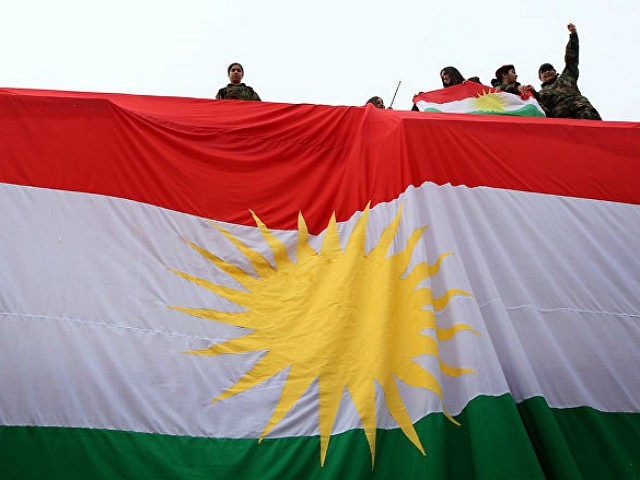WASHINGTON, D.C. — The autonomous Kurdish region in northern Iraq will likely become an independent state after the Islamic State (ISIS/ISIL) is defeated in the country, the director of the Defense Intelligence Agency (DIA) told lawmakers.
Asked by a member of the Senate Armed Services Committee on Tuesday about the Kurdish Regional Government’s (KRG) intention to move forward with a referendum on independence after ISIS falls in Iraq, Marine Lt. Gen. Vincent Stewart, the chief of the Pentagon’s intelligence arm, responded:
Kurdish independence is on a trajectory where it is probably not if, but when. And it will complicate the situation unless there’s an agreement in Baghdad — an agreement that all of the parties can live with. So this a significant referendum that comes up in October this year.
In its most recent Worldwide Threat Assessment, the DIA warned:
Financial shortcomings and institutional limitations of the Kurdistan Regional Government will continue to limit Kurdish forces’ military and counterterrorism capabilities. Iraqi Kurds have stated that they intend to seek greater autonomy from Baghdad—up to and including independence. As part of this effort, Kurdish leaders are seeking to hold a non-binding referendum, which could be held concurrently with Kurdish elections scheduled for fall 2017.
Under current U.S. policy, all American aid for the predominantly Sunni Iraqi Kurds is channeled through the Iran-allied and Shiite-controlled Iraqi government in Baghdad.
Although ISIS is apparently currently on its last legs in Mosul, considered the group’s last major stronghold in Iraq, the jihadist organization still holds about 40 percent of the territory it controlled at the height of its power in August 2014, noted Gen. Stewart.
Iraqi Kurdish Peshmerga forces have played a major role in the U.S.-led coalition’s efforts to push ISIS out of Iraq.
This year, leaders of major Kurdish Iraqi parties announced that they will hold a referendum on independence this year.
For years, Iraq’s Kurdish population has been asking for independence despite residing in an autonomous region within the country.
The Kurdish independence question is not the only problem facing post-ISIS Iraq.
“Once ISIS is defeated in Mosul, the greatest challenge to the Iraqi government is to reconcile the differences between the Shiite-dominated government, the Sunnis out west and the Kurds of the north,” pointed out the DIA director. “Resolving the Kirkuk oil field and the revenues associated with the oil fields, resolving the ownership of the city of Kirkuk will be significant political challenges for the Iraqi government.”
“Failure to address those challenges coming up with a political solution will ultimately result in conflict among all of the parties,” he added. “To resolve this and going back to what could devolve into a civil strife in Iraq. Those are significant challenges.”
The Kurds have claimed control of Kirkuk, which they fought to defend from ISIS after Baghdad-affiliated forces abandoned their posts in June 2014.
In a defiant message to the Shiite-led government in Baghdad, the governor of Kirkuk raised the Kurdistan flag in the province back in February, saying the move is permanent.
Referring to Iraqi Kurdish independence, Director of National Intelligence (DNI) Dan Coats told the Senate panel: “It certainly adds an issue that is going to need to be worked through as complicated as the situation is. It would add one more complication.”
The United States has so far opposed Iraqi Kurdish independence, adhering to the “One Iraq” policy instead.
However, President Donald Trump has signaled a shift in America’s policy towards the Kurds, approving efforts to directly arm fighters from People’s Protection Units (YPG) currently combating ISIS in Syria despite objections from Turkey. The YPG, however, is independent from the Iraqi KRG and has tense relations with its Iraqi counterpart.
Turkey has long accused the U.S.-backed YPG, the armed wing of the Democratic Union Party (PYD) that controls large swathes of northern Syria, of being affiliated with the Kurdistan Worker’s Party (PKK), a communist separatist group that has been deemed a terrorist organization by Washington and Ankara. The Turkish government maintains friendly relations with the KRG, which has repeatedly demanded the PKK leave Iraq.
Iraq and its neighbors Iran, Turkey, and Syria have historically opposed Iraqi Kurdish independence, fearing that the sentiment will spread to their own Kurdish communities.
There has already been friction between the predominantly Sunni Kurds and the Baghdad-sanctioned Popular Mobilization Units (PMU), also known as the Popular Mobilization Forces (PMF) and Hashd al-Shaabi, an Iran-allied group primarily made up of Shiite fighters.
“Iraq’s parliament passed a law in November 2016 that formalized the PMF in Iraq’s security apparatus, enabling these forces to endure as an official arm of the Iraqi security forces even after ISIS is expelled,” testified Stewart, adding, “The presence of the PMF in areas liberated from ISIS would likely increase ethnic tension with the Kurds and Sunni Arabs and may lead to violent clashes.”
Despite its recent territory and manpower losses in Iraq and Syria, ISIS remains a major threat to the United States.
“ISIS is experiencing territorial losses in Iraq and Syria,” the DNI told Senators. “However, we assess ISIS will continue to be an active terrorist threat to the United States due to its proven ability to direct and inspire attacks against a wide range of targets around the world.”

COMMENTS
Please let us know if you're having issues with commenting.